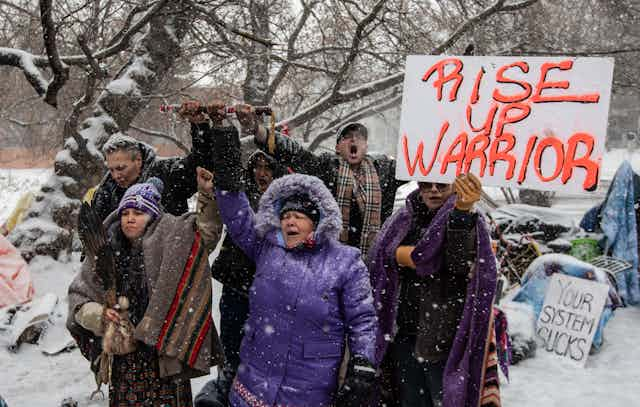It feels like housing is at a tipping point in the city of Edmonton.
There have been four main events highlighting the situation:
- A case that was brought against the City of Edmonton by the Coalition for Justice and Human Rights about encampment sweeps;
- Encampment sweeps perpetrated by the Edmonton police days before a forecasted deadly cold snap;
- A decision by Edmonton City Council to declare a housing and homelessness emergency;
- The Alberta government’s announcement that encampments will continue to be cleared out, while also arguing there’s sufficient shelter room. That contention has been refuted by advocates, shelter workers and the province’s official housing critic.
These events should be understood within ongoing settler colonialism and a housing crisis endemic in Canada’s broader housing system.
Housing in Canada
The state of housing both in Canada and globally is worsening, but the housing crisis is not new.
Read more: Two-thirds of Canadian and American renters are in unaffordable housing situations
While affordable housing policies in Canada emerged following the Second World War, colonialism is foundational to housing policy, evidenced by the high rates of housing vulnerability that Indigenous Peoples face.
For example, residential schools, the pass system and other strategies to force relocation, outlined by history scholar James Daschuk in his book Clearing The Plains, have limited housing for Indigenous Peoples. Colonial policies are foundational to the current housing system and people’s housing experiences.
Under Canada’s National Housing Strategy Act passed in 2019, the federal government affirmed the human right to housing. This means governments of all levels have a responsibility to recognize this human right.
Read more: 'Clearing the plains' continues with the acquittal of Gerald Stanley
Encampment sweeps violate human rights
This isn’t happening, apparently, when it comes to encampments, which are both a site of human rights violations and of human rights claims.
The Coalition for Justice and Human Rights was denied legal standing by the judge in its case against Edmonton because he ruled it wasn’t the right group to represent the interests of people experiencing homelessness.
While that means this particular case will not proceed, it garnered significant media attention and does not refute the claims by the coalition, only its standing.
The coalition argued human rights were violated during encampment sweeps. It sought to maintain permanent restrictions on encampment evictions, and had been supported by many advocates in Edmonton, including those who submitted affidavits.
While the coalition’s claims are important, appealing to human rights does not necessarily identify the depth of colonialism’s role in the ongoing events.

Encampment evictions also happen in the context of treaty rights and the United Nations Declaration on the Rights of Indigenous Peoples, which are violated when Indigenous people are forcibly removed from land.
In the case of the sweep of one Edmonton encampment, a sacred fire was extinguished despite the agreement between an Elder and Edmonton police that a few tents and the fire could remain.
Jesse Thistle, a Métis-Cree assistant professor at York University, has developed a definition of Indigenous homelessness that doesn’t just encompass structure and property rights, but also land, traditions, ancestors and family — all of which amplify how the loss of community and relationships that are present at an encampment entrenches homelessness.
Housing scholar and activist Andrew Crosby uses the concept of domicide — the destruction of home — to examine how settler colonialism is founded on the destruction of Indigenous homes and lives.
Domicide is applicable to the encampment sweeps in Edmonton, the historical domicide that enabled the settlement of Edmonton in the first place, and the laws that governed the unsuccessful lawsuit launched by the Coalition for Justice and Human Rights.
Coming together in colonialism
Removing unhoused people, who are disproportionately Indigenous, illustrates that public land is not for living on and is instead settler colonial space. When authorities make reference to “public safety” concerns about encampment, unhoused people are positioned as dangerous.
The destruction of those encampments simply drives people who are unhoused further to the margins. Sweeps do not end people’s experiences of homelessness; they move them out of public view.
The actions of the City of Edmonton, the city’s police force and the government of Alberta — as well as the courts — have coalesced into an attack on the human and treaty rights of people who are unhoused, as well as the continuation of the removal of Indigenous Peoples from their land.
Homelessness in Edmonton has resulted in increased amputations due to exposure to extreme cold, while encampment sweeps lead to the overburdening of a shelter system that is already inadequate and the denial of rest for people who are unhoused.
This isn’t to suggest that encampments should be enshrined as a human rights housing achievement. But punitive approaches like encampment sweeps perpetuate settler colonialism and prioritize the perceptions and preferences of the ruling class.

